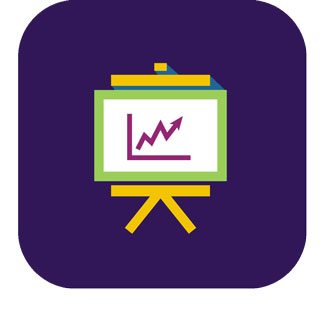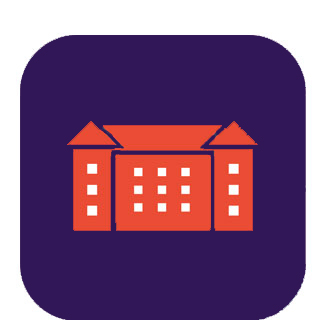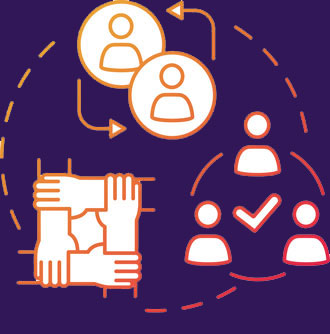Neurodiversity at Work at Kennedy Krieger Institute offers dynamic, in-person Workforce Awareness and Inclusion training tailored for Institute employees, local and international businesses, and a national audience. Serving as a catalyst for collaboration and innovation, these sessions inspire meaningful dialogue, offer actionable strategies and empower participants to embrace neurodiverse talent. Together, we’re shaping more inclusive, forward-thinking workplaces—where untapped potential becomes a powerful driver of success.
We provide support to each individual and business for successful, sustainable, and integrated employment for all abilities.
Training Opportunities
In person, Hybrid and Virtual Training Options are offered
- Package pricing is also available
Please reach out via the Training and Education Inquiry Form for more information.
A 14% indirect charge is applied to all training services.
Inclusive Workplace
The Neurodiversity Movement Training
This interactive and thought-provoking training offers an overview of neurodiversity, building an inclusive workforce, breaking down employment barriers and understanding the business case for hiring individuals of all abilities.
Designed to equip employers with practical strategies and education, the training helps organizations better hire, retain and support employees with disabilities. With 80% of individuals who identify as having a disability currently not participating in the workforce, this training presents actionable business solutions for advancing workforce diversity. Topics include workplace accommodations, universal design and partnering with adult service agencies as a recruitment strategy. This presentation will cover the following topics and more:
- Barriers to employment for individuals with disabilities
- Best practices for recruitment, management, and retention strategies
- Disability education
- Workplace accommodations
- Self-disclosure
- What is an adult service provider
- Communication, interview, and onboarding strategies
- Employer and provider collaboration for recruitment
- First-hand experiences from businesses and the individuals they employ
- Overview of Universal Design
The Neurodiversity Movement: Initial Training Package $750
- 1 prep meeting
- 60-minute interactive training
- Q&A
- 1-page summary document
- 1 expert trainer
The Neurodiversity Movement: Basic Training Package $1250 **1.5 SHRM CEUs
- Up to 2 prep meetings
- 90-minute interactive training
- Q&A
- 1-page summary document
- 2 expert trainers
The Neurodiversity Movement: Advanced Training Package $2500 **3 SHRM CEUs
- Up to 4 prep meetings
- 3-hour interactive training
- Q&A
- Customized facilitated discussions (part of the training experience)
- 1-page summary document
- 2 expert trainers
The Neurodiversity Movement: Multi-training Package $3000
- Up to 4 prep meetings
- Interactive trainings (1 hour each)
- Four trainings
- Scheduled Quarterly
- Q&A
- 1-page summary document
- 1 expert trainer per training
The Neurodiversity Movement: Ultimate Training Package $4600 **SHRM CEUs available
- Up to 4 prep meetings
- Interactive trainings (1 hour each)
- Four trainings
- Scheduled Quarterly
- 2 Customized Facilitated Discussions (90 minute each)
- 4 Virtual consultations (1 hour each)
- Q&A
- 1-page summary document
- 2 expert trainers
The Neurodiversity Movement: Full Day Training Package $5500 (per day)
- Up to 3 prep meetings
- 6 hour customized interactive training
- Q&A
- 2 trainers and 2 administrative team members
- Tentative agenda will be provided
Strategic Approaches Universal Design
Course Description
This presentation offers an overview of Universal Design and how businesses can apply their principles to create a more inclusive workforce.
Strategic Approaches Overview of Disabilities
Course Description
This presentation will provide a brief overview of disabilities, disability services, and strategies to support an inclusive workforce.
Strategic Approaches Interview and Workplace Modifications
Course Description
This presentation will share practical strategies businesses can implement to hire and retain individuals with disabilities, helping to remove barriers that prevent access to meaningful employment.
Strategic Approaches Adjusting to a Remote Workplace
Course Description
This presentation will explore how to develop, design and sustain a remote workplace in a post-pandemic environment. We will reflect on lessons learned, examine the benefits of remote work and discuss the ongoing supports businesses should consider maintaining. This session will be highly discussion-focused to encourage shared insights and strategies.
Add-On Options (to an existing package):
Strategic Approaches Training $250
- 30- minute training
- Q&A
- One trainer
Virtual Business Consultation $150 per hour
Facilitated Discussions $500+
- 90-minute session
- $500 per facilitator, per hour (varies based on size and request)
- Virtual or In-person
Review and Feedback Review (Job Descriptions, Current Trainings)
- Starting at $250
- Price Varies based on request
Job Development 101
- The Role of the Job Coach
Successful Strategies for Implementation of Employment Services
Advocacy Awareness
Transition School to Adulthood
Setting Up Students for Success
Course Description
This presentation offers an overview of the best practices for preparing students with disabilities for a successful transition to adulthood. Presenters will highlight the different pathways available to students after high school and emphasize the importance of involving family members, teachers and other support team members throughout the transition process. This interdisciplinary, person-centered approach empowers youth and their families to make informed decisions about their future.
Attendees will learn:
- How to identify and apply effective transition practices and strategies across programs
- Best practices for supporting a smooth transition from school to adulthood
- Strategies for setting clear expectations for members of the student’s support team
- Methods for incorporating person-centered planning throughout the transition process
Setting Students up for Success: Initial Training Package $750
- 1 prep meeting
- 60-minute interactive training
- Q&A
- 1-page summary document
- 1 expert trainer
Setting Students up for Success: Basic Training Package $1250
- Up to 2 prep meetings
- 90-minute interactive training
- Q&A
- 1-page summary document
- 2 expert trainers
Employment Services
Job Development 101
This course takes a multifaceted, person-centered approach to helping individuals with disabilities obtain and maintain meaningful employment and engage fully in their communities. Divided into three parts, the session provides a comprehensive overview of employment services and the job development process.
- Part 1: An overview of service delivery models related to employment services and a breakdown of the job development process.
- Part 2: Tools, strategies and best practices to support job advancement and career development.
- Part 3: Best practices for building, sustaining and growing relationships with businesses and industry representatives, including real-world examples.
Learning Objectives:
- Increase knowledge of person-centered strategies to promote job advancement and career development
- Expand understanding of best practices for creating employment and career opportunities
- Strengthen strategies for developing and maintaining partnerships with businesses and industry leaders
Strengthen strategies for developing and maintaining partnerships with businesses and industry leaders
The Role of the Job Coach
Course Description:
The job coach plays a crucial role in helping individuals acquire workplace knowledge, develop job readiness skills, and secure and sustain meaningful, competitive integrated employment. This course will explore the essential responsibilities of the job coach, focusing on best practices for enhancing job skills, preparing individuals for interviews, job development, community surveying and building business relationships. It will also cover effective training techniques to help individuals navigate the work environment and maintain employment. Additionally, the course will address strategies for building natural supports within the workplace and community, fostering relationships and networks to support long-term success.
Learning Objectives:
- Supporting informed employment choices
- Creating individualized training techniques and workplace modifications
- Building and sustaining a network of natural supports
- Enhancing employability and job-specific skills
Successful Strategies for Implementation of Employment Services
Course Description
Why Customized Employment? We focus on identifying the interests, strengths and conditions necessary for successful employment. Using evidence-based best practices, we support the implementation of competitive, integrated employment services. This course explores how Customized Employment is a flexible approach designed to meet the unique needs of both job applicants and businesses. Additionally, it offers strategies for building and maintaining strong business relationships through training and person-centered methods aimed at employee retention and career advancement.
Learning objectives
- Understanding the value of customized employment
- Applying evidence-based models to develop competitive, integrated employment services
- Developing strategies for employee retention and long-term success
Advocacy Awareness
Course Description
In addition to raising awareness about individual rights, supporters play a crucial role in ensuring those rights are being realized. This course will guide conversations to assess whether the services provided offer meaningful opportunities for inclusion, choice and independence, and whether advocacy is required. It's essential to ask, listen and observe to understand what the person you support truly wants in terms of community involvement and work-life balance. The course will also explore what it means to be an advocate in various roles and how to influence attitudes that can improve employment and retention outcomes for individuals with disabilities.
Learning objectives
- Understanding the role of an advocate (family member, friend, job coach, employer)
- Setting self-determination goals
- Recognizing the importance of communication for everyone
- Overcoming attitudinal barriers to inclusion
Partnership Training
Maryland APSE (Association for People Supporting Employment First)
Voter Registration, Voter rights, and playing a support role as an accommodation
Course Description
- The importance of advocacy and voting.
- Your vote is how you influence policy and your vote is your voice.
- Voting is a right and a responsibility and there are people who have worked really hard to ensure people with disabilities have the right to vote.
- Who can support you when voting.
Click here for more information on Maryland APSE.
CESP – Learn about the benefits, credential, examination process, and the National APSE organization
Course Description
The CESP credential is designed for job coaches, job developers, transition employment specialists, job placement personnel, and employment specialists/ consultants who serve a wide variety of target audiences, including individuals with intellectual/ developmental disabilities, mental health diagnoses, sensory impairments, physical disabilities, traumatic brain injuries and autism spectrum disorders. In this discussion, participants will learn about the benefits of the CESP credential, how to register and prepare for the examination, and a better understanding of the overall goals of National APSE.
Maryland Works – The Employment Works Program: How to Become a Vendor and Access Jobs
Course Description
This presentation will give a high-level overview of Maryland Works and the Employment Works Program. It will describe how a business or individual with a disability who owns a business can become an eligible vendor with MD Works.
The Employment Works Program strives to create equitable employment opportunities for people with disabilities, while providing the State of Maryland with high quality services and commodities. Maryland Works, is designated to coordinate contracting activities between the State of Maryland, Community Service Providers, and people with Disability Owned Businesses. This is in accordance with the State Finance and Procurement Article, Sections 14-101 through 14-108 of the Annotated Code of Maryland.
Interested in learning more about workforce training opportunities?
Contact Stacey Beichler,MS ED, CESP, AVP, Neurodiversity and Community Workforce Development at HermanSt@KennedyKrieger.org or Sumaiyah Mahmoodi, Project Coordinator, at Mahmoodi@KennedyKrieger.org.
For more information click on the Training Inquiry Form link.
Training Inquiry Form





